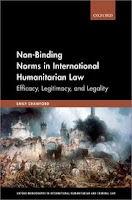 The latest issue of the Revista Española de Derecho Internacional (Vol. 73, no. 2, 2021) is out. Contents include:
The latest issue of the Revista Española de Derecho Internacional (Vol. 73, no. 2, 2021) is out. Contents include:- Estudios. Migraciones y asilo: análisis y perspectivas
- Nuria Arenas Hidalgo, El principio de solidaridad y reparto equitativo de la responsabilidad entre Estados en la política europea de asilo: la conformación de la reubicación en un contexto de crisis
- Mª Carmen Chéliz Inglés, El laberinto jurídico de la protección de los menores migrantes abandonados: una aproximación desde el Derecho internacional privado
- Waldimeiry Corrêa da Silva, Movilidad internacional y el mercadeo de la migración segura a través de la teoría crítica de las Relaciones Internacionales
- Eva Díez Peralta, La política convencional de la UE sobre readmisión de inmigrantes irregulares: una cooperación opaca y con implicaciones graves para los derechos humanos
- Teresa Fajardo del Castillo, El derecho humano a abandonar un país, incluido el propio: las excepciones a la regla
- Jorge García Burgos, La cooperación migratoria en la configuración de las relaciones entre España y África Subsahariana
- Víctor Luis Gutiérrez Castillo, Los procesos probatorios de solicitudes de asilo por orientación sexual e identidad de género en Europa: análisis desde la perspectiva de los derechos humanos
- Diana Marín Consarnau, Nuevos y heredados desafíos en el contexto del regreso al país de origen del ciudadano de la Unión y su familia
- Lucas J. Ruiz Díaz, Entre apoyo a la integración y prevención de la radicalización. Una mirada crítica al plan de acción de integración e inclusión de la Unión Europea
- Ana Salinas de Frías, La insuficiente protección jurídica internacional de los migrantes irregulares víctimas de trata
- Beatriz Vázquez Rodríguez, Las obligaciones de los Estados en materia de prevención y protección contra la trata de mujeres con fines de explotación sexual en el contexto migratorio
- Estudios. Miscelánea
- Laura Esperanza Aragonés Molina, La buena administración de justicia en la jurisdicción internacional penal: excepciones a la aplicación estricta de la normativa procesal en materia de recursos
- Mónica Herranz Ballesteros, El Reglamento (UE) 2019/1111 relativo a la competencia, el reconocimiento y la ejecución de resoluciones en materia matrimonial y de responsabilidad parental y sobre la sustracción internacional de menores (versión refundida): principales novedades
- José A. Moreno Rodríguez, La nueva guía de la Organización de Estados Americanos y el derecho aplicable a los contratos internacionales (Parte II)
- Laura Movilla Pateiro, ¿Hacia un cambio de paradigma en el derecho del espacio ultraterrestre?: los Acuerdos Artemisa
- Xavier Pons Rafols, Biología sintética y Derecho internacional: débiles consensos ante desafíos inmensos
- Esteban Vidal Pérez, La construcción de una potencia global: la influencia de la competición geopolítica internacional en la transformación de la esfera doméstica de Estados Unidos



















































